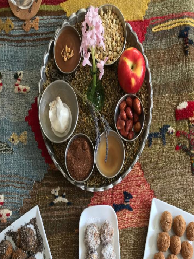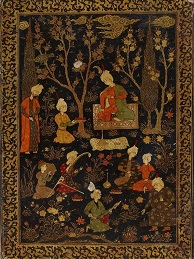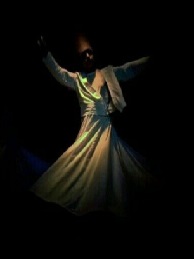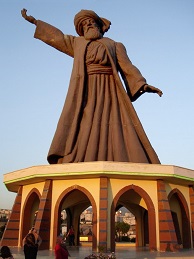Jalal al-Din Rumi was born in Balkh in Great Khorasan of Greater Iran in the year A.H. 604/A.D. 1207. Rumi’s father, Baha Walad, was a well-known preacher, jurisprudence, and Sufi. Around the year 616/1219 the Mongols were moving ever closer to Balkh. Baha Walad left the city with his family and many followers. After making the pilgrimage to Mecca, Baha Walad set out for Asia minor where he was received warmly in Konya in present-day Turkey by the Seljuk king Ala al-Din Kayqubad and his vizier Muin al-Din Parwaneh who was later to become one of Rumi’s most influential devotees. Baha Walad occupied a high position soon among the city’s scholars and was given the title Sultan al- ulama, “Sultan of the men of Knowledge.”
In the tradition of his predecessors, Rumi began studying the exoteric sciences at an early age. At the age of twenty-four he was asked to assume his father’s duties as a preacher and jurisprudent. Rumi gained widespread fame as one of the most respected doctors of the Law. He occupied himself mainly with preaching to and guiding the people of Konya, while he continued his own spiritual practices as a Sufi adept. He preserved the customary activities and symbols of a solid and honored doctor of the Law. Sometimes he would discuss the spiritual mysteries in his sermons. But, he never gave any noticeable indication that he was any different than other jurisprudents and lawyers for having knowledge of them. But, in the year 642/1244 the inexplicable figure Shams al-Din of Tabriz came to Konya and Rumi was transformed.
Shams-i Tabrizi’s influence upon Rumi was pivotal. Through Shams Rumi was transformed from a sober jurisprudent to an intoxicated worshiper of the “mysteries of the Divine Love”. After this life changing experience, Rumi started writing poems and carried on doing so for 28 years. Rumi’s major works are the Diwan-i Shams-i Tabrizi of some 40,000 verses and the Mathnawi of about 25,000 verses. Furthermore, three collections of his talks and letters have been preserved. (The Sufi Path of Love, The Spiritual Teachings of Rumi, William C. Chittick)
I was the country’s sober ascetic, I used to teach from the pulpit __but destiny made me one of Thy hand-clapping lovers. (Diwan-I Shams-i-Tabrizi, Ghazal 2152, Translation by William C. Chittick)
زاهد کشوري بدم صاحب منبري بدم. کرد قضا دل مرا عاشق و کف زنان تو
My hand always used to hold a Koran, but now it holds Love’s flagon. (Diwan-I Shams-i-Tabrizi, Ghazal 2351, Translation by William C. Chittick)
در دست همیشه مصحفم بود. وز عشق گرفتهام چغانه
My mouth was filled with glorification, but now it recites only poetry and songs. (Diwan-I Shams-i-Tabrizi, Ghazal 2351, Translation by William C. Chittick)
اندر دهنی که بود تسبیح. شعر است و دوبیتی و ترانه
Passion for that Beloved took me away from erudition and reciting the Koran until I became as insane and obsessed as I am. (Diwan-I Shams-i-Tabrizi, Ghazal 2498, Translation by William C. Chittick)
مرا سودای آن دلبر ز دانایی و قرایی. برون آورد تا گشتم چنین شیدا و سودایی
I had followed the way of the prayer carpet and the mosque with all sincerity and effort. I wore the marks of asceticism to increase my good works. (Diwan-I Shams-i-Tabrizi, Ghazal 2498, Translation by William C. Chittick)
سر سجاده و مسند گرفتم من به جهد و جد. شعار زهد پوشیدم پی خیرات افزایی
Love came into the mosque and said, “Oh great teacher! Rend the shackles of existence! Why are you tied to prayer carpets? (Diwan-I Shams-i-Tabrizi, Ghazal 2498, Translation by William C. Chittick)
درآمد عشق در مسجد بگفت ای خواجه مرشد. بدران بند هستی را چه دربند مصلایی
Let not your heart tremble before the blows of My sword! Do you want to travel from knowledge to vision? Then lay down your head! (Diwan-I Shams-i-Tabrizi, Ghazal 2498, Translation by William C. Chittick)
به پیش زخم تیغ من ملرزان دل بنه گردن. اگر خواهی سفر کردن ز دانایی به بینایی
If you are a profligate and a scoundrel, do justice to troublemaking! If you are beautiful and fair, why do you remain behind the veil? (Diwan-I Shams-i-Tabrizi, Ghazal 2498, Translation by William C. Chittick)
بده تو داد اوباشی اگر رندی و قلاشی. پس پرده چه میباشی اگر خوبی و زیبایی






